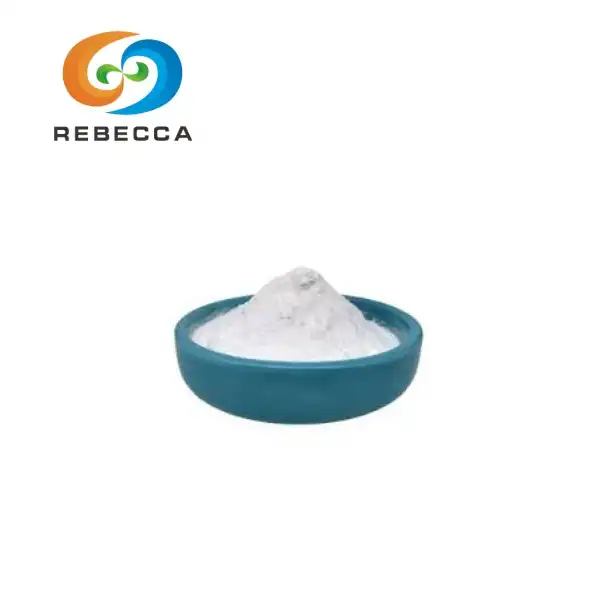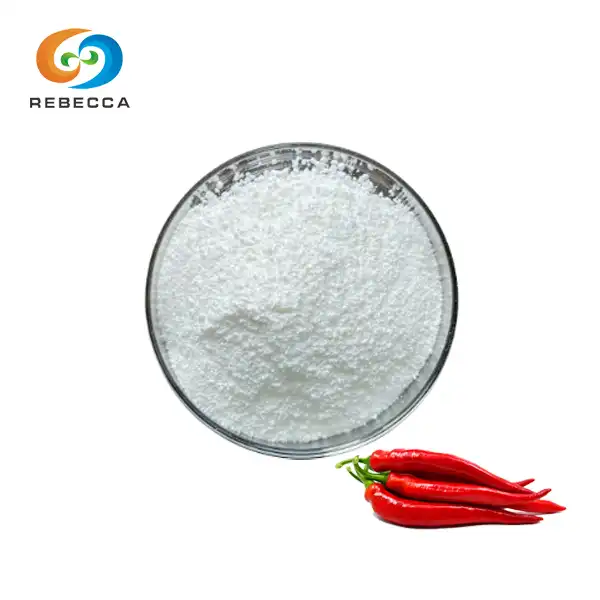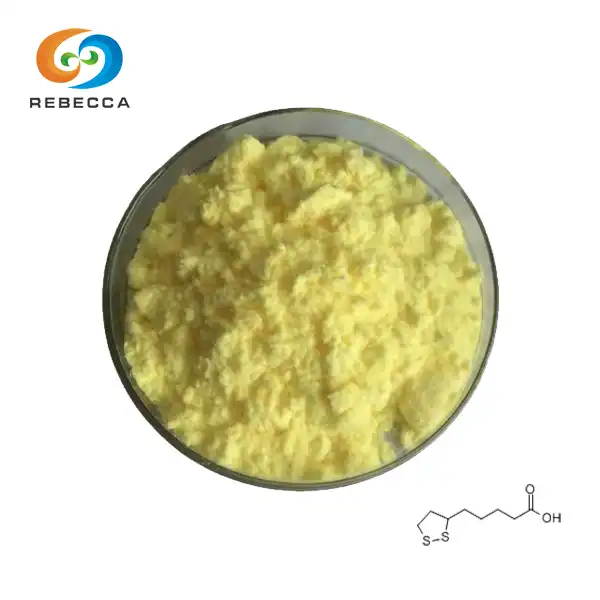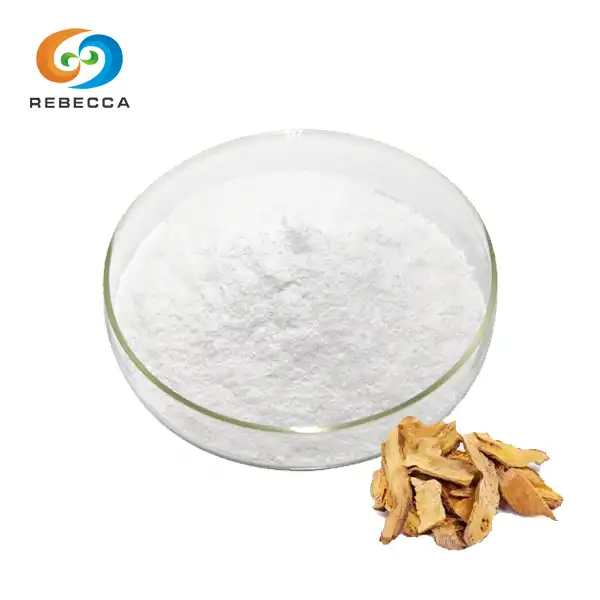Pure Gastrodin for Cognitive Health
In the quest for optimal cognitive function and brain health, researchers have uncovered a promising natural compound: pure gastrodin. Derived from the orchid-like plant Gastrodia elata, gastrodin has been used in traditional Chinese medicine for centuries. Today, modern science is shedding light on its potential benefits for cognitive health, memory enhancement, and neuroprotection. This article delves into the world of pure gastrodin, exploring its mechanisms, comparing it to traditional cognitive supplements, and providing guidance on its safe use.

How Pure Gastrodin Supports Brain Function?
Pure gastrodin offers a multifaceted approach to supporting cognitive health. Its neuroprotective properties stem from its ability to modulate various biochemical pathways in the brain. Here's how gastrodin works its magic:
Antioxidant Power
Oxidative stress is a major culprit in cognitive decline and neurodegenerative diseases. Gastrodin acts as a potent antioxidant, neutralizing harmful free radicals and reducing oxidative damage to brain cells. This protective effect helps maintain the integrity of neural structures and promotes overall brain health.
Neurotransmitter Regulation
Gastrodin has been shown to influence the levels and activity of crucial neurotransmitters in the brain. It may enhance the production of gamma-aminobutyric acid (GABA), the primary inhibitory neurotransmitter that promotes relaxation and reduces anxiety. Additionally, gastrodin may modulate dopamine and serotonin levels, potentially improving mood and cognitive function.
Cerebral Blood Flow Enhancement
Optimal brain function relies on adequate blood flow to deliver oxygen and nutrients. Gastrodin has vasodilatory properties, meaning it can help dilate blood vessels in the brain. This increased cerebral blood flow may contribute to improved cognitive performance, especially in tasks requiring sustained attention and mental clarity.
Neuroprotection Against Excitotoxicity
Excitotoxicity, the process by which nerve cells are damaged or killed by excessive stimulation from neurotransmitters, is implicated in various neurological disorders. Gastrodin has demonstrated the ability to protect neurons from excitotoxic damage, potentially slowing the progression of neurodegenerative diseases.
Anti-inflammatory Effects
Chronic inflammation in the brain is associated with cognitive decline and various neurological conditions. Gastrodin exhibits anti-inflammatory properties, helping to mitigate neuroinflammation and support overall brain health.

Pure Gastrodin vs. Traditional Cognitive Supplements
When comparing pure gastrodin to other cognitive supplements, it's essential to consider its unique properties and potential advantages:
Broad-Spectrum Effects
Unlike some cognitive enhancers that target specific pathways, gastrodin offers a more holistic approach to brain health. Its ability to influence multiple neurotransmitter systems, reduce oxidative stress, and improve cerebral blood flow makes it a versatile option for cognitive support.
Natural Origin
As a plant-derived compound, gastrodin may appeal to those seeking natural alternatives to synthetic nootropics. Its long history of use in traditional medicine also provides a degree of cultural significance and empirical support.
Potential for Neuroprotection
While many cognitive supplements focus on short-term performance enhancement, gastrodin's neuroprotective properties suggest potential long-term benefits for brain health. This makes it an intriguing option for those concerned about age-related cognitive decline or neurodegenerative diseases.
Anxiolytic Properties
Unlike stimulant-based cognitive enhancers that may increase anxiety, gastrodin has shown anxiolytic (anti-anxiety) effects. This dual action of cognitive support and stress reduction sets it apart from many traditional nootropics.
Synergistic Potential
Gastrodin's diverse mechanisms of action may complement other cognitive supplements or nootropics. This synergistic potential could lead to more comprehensive cognitive enhancement strategies when used as part of a well-designed stack.
Safety Profile
Compared to some synthetic cognitive enhancers, gastrodin has a favorable safety profile with few reported side effects. However, as with any supplement, individual responses may vary, and proper dosing is crucial.

Best Practices for Using Pure Gastrodin Safely
To maximize the potential benefits of pure gastrodin while minimizing risks, consider the following best practices:
Consult a Healthcare Professional
Before incorporating gastrodin into your cognitive health regimen, consult with a healthcare provider, especially if you have pre-existing medical conditions or are taking medications. They can help determine if gastrodin is appropriate for your individual needs and circumstances.
Start with a Low Dose
Begin with the lowest effective dose of pure gastrodin and gradually increase as needed. This approach allows you to assess your body's response and minimize the risk of adverse effects. Typical doses range from 300-900 mg per day, but individual requirements may vary.
Monitor Your Response
Pay attention to how your body and mind react to gastrodin supplementation. Keep a journal to track changes in cognitive function, mood, and any potential side effects. This information can help you and your healthcare provider optimize your dosage and usage.
Combine with a Healthy Lifestyle
Gastrodin is not a magic bullet for cognitive health. Combine supplementation with a brain-healthy lifestyle that includes regular exercise, a balanced diet rich in antioxidants and omega-3 fatty acids, quality sleep, and stress management techniques.
Consider Cycling
To prevent tolerance and maintain effectiveness, some users choose to cycle their gastrodin intake. This might involve taking it for a set period (e.g., 4-6 weeks) followed by a break. Consult with a healthcare professional to determine if cycling is appropriate for you.
Be Aware of Potential Interactions
While gastrodin is generally well-tolerated, it may interact with certain medications, particularly those affecting neurotransmitter systems or blood flow. Inform your healthcare provider of all supplements and medications you're taking to avoid potential interactions.
Choose High-Quality Sources
Ensure you're getting pure gastrodin from a reputable source. Look for third-party tested products with clear labeling of active ingredients and dosage information. Avoid products with unnecessary fillers or additives.

Conclusion
In conclusion, pure gastrodin represents a promising natural option for supporting cognitive health and function. Its multifaceted approach to neuroprotection and cognitive enhancement sets it apart from many traditional supplements. By understanding its mechanisms, comparing it to other options, and following best practices for safe use, you can make an informed decision about incorporating gastrodin into your cognitive health strategy. For more information on pure gastrodin and other natural herbal extracts, please contact us at information@sxrebecca.com.
References
1. Chen, P. J., et al. (2016). Gastrodin protects against MPP+-induced oxidative stress by up regulating heme oxygenase-1 expression through p38 MAPK/Nrf2 pathway in human dopaminergic cells. Neurochemistry International, 96, 1-7.
2. Kumar, H., et al. (2013). Gastrodin protects apoptotic dopaminergic neurons in a toxin-induced Parkinson's disease model. Evidence-Based Complementary and Alternative Medicine, 2013, 514095.
3. Liu, Y., et al. (2018). Gastrodin improves cognitive dysfunction and decreases oxidative stress in vascular dementia rats induced by chronic ischemia. Frontiers in Neuroscience, 12, 482.
4. Peng, Z., et al. (2015). Gastrodin ameliorates anxiety-like behaviors and inhibits IL-1β level and p38 MAPK phosphorylation of hippocampus in the rat model of posttraumatic stress disorder. Physiological Research, 64(3), 357-364.
5. Zhang, J. S., et al. (2011). Gastrodin protects against MPP+-induced oxidative stress by up regulating heme oxygenase-1 expression through p38 MAPK/Nrf2 pathway in human dopaminergic cells. Neurochemistry International, 58(1), 119-125.
_1730691017423.webp)




















